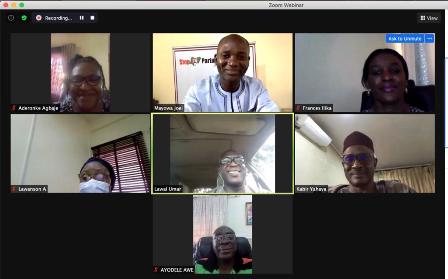Experts yesterday, Monday September 7, decried the decline in tuberculosis (TB) control activities as the country concentrates all efforts towards curtailing the COVID-19 pandemic, warning that neglecting TB could worsen its serious danger to public health.
The experts who spoke at a virtual TB Media Roundtable on the theme: “Impact of COVID-19 on TB: Challenges and Opportunities for Service Delivery, Policy and Financing” noted that the emergence of COVID-19 in Nigeria has negatively affected the country’s TB programme,
They called on governments at all levels and other stakeholders to intensify efforts aimed at detecting more TB cases to curb further spread, just as the COVID-19 pandemic is being tackled from all fronts.

In his presentation, the Medical Officer in charge of TB, World Health Organisation and Chairman Stop TB Partnership Nigeria, Dr. Ayodele Awe disclosed that Nigeria is still missing 300,000 new cases every year, adding that the country was able to detect only 25% of the expected cases. Yet, he said, TB remains the top infectious killer worldwide, killing more people than COVID-19.
“Do you know that more people are dying of TB daily than for COVID-19. Each hour, there are 18 deaths on TB. Each day, 430 persons are dying. Each year, 157,000 persons die of TB, he stated.”
Dr Awe and other experts at the webinar however expressed worry that despite the similarities in TB and COVID, a situation that should have warranted that the nation adopt measures aimed at curbing the two diseases at the same time, using similar approach in many instances, TB seems to have been ignored.
National Tuberculosis and Leprosy Control Progeramme, Dr. Adebola Lawanson listed some of the similarities which include their symptoms and deadly nature.
“Their symptoms are similar – cough, fever and difficulty in breathing. Primarily, they affect the lungs and their mode of transmission is also via close contact – the droplets (and) through the air. However the incubation period is shorter for COVID and longer for TB. Everybody is at risk. Morbidity and mortality for both diseases is higher among the immuno-compromised, people living in poor, overcrowded environments and the underprivileged.
“While one is being caused by the novel corona virus (SARS-CoV- 2), TB is caused by mycobacterium tuberculosis (germ). We know the cause of illness. For COVID it is very quick and disappears in about 7 days and in some cases but actually leads to death whereas symptoms for TB appears gradually over the cause of several weeks and precedes, if not treated.
“They both affect the upper respiratory tract. For COVID, (there is) nasal congestion and runny nose but that is absent in TB. (There’s also) persistent cough, which appears suddenly for COVID (and) lasting over two weeks or more for TB. The cough is mostly dry for COVID but in TB, sputum are produced and may be stained with blood.
“Difficulty in breathing actually occurs in COVID and will also occur in advanced stage for TB. Fever is very high when we talk about COVID but low in TB. There’s no weight loss in COVID-19 except there is underlying sicknesses but we see weight loss in TB. Diarrhoea will occur in COVID 19 but absent in TB.”
Unfortunately, Dr. Lawanson disclosed that COVID-19 impacts negatively in the lives of TB patients and the control programme in general. For instance, during the COVID-19 lockdown, many TB patients could not access treatment while many are still bogged down with the hardship occasioned by the negative impact of COVID-19 on the economy.
Also, she said, the problem of multidrug resistant TB increased at the height of COVID-19 pandemic as it became difficult for health facilities and health care workers to continue with monitoring and supervision of TB patients.
The experts also lament that the GeneXpert machine used for case detection in both COVID-19 and TB still remain inadequate.
In her presentations, the Country Director, USAID Health Policy Plus Project, Francesca Ilika urged governments to buy additional GeneXpert machines and also equip the existing GeneXpert sites. Each state, she said should also endeavour to build laboratories with wider health system impact.
“For us to be able to make progress in these areas, governance is very important. We need decision makers at the state and national levels to have clear policies. We need policies that will ensure that when they are screening for COVID-19, they are also screening for TB. We also need to spend on purchase of GeneXpert machines, building up the GenXpert sites and molecular laboratory sites to make sure we have a wider health system impact even beyond COVID-19..
”Evidence gathering is also very important so we need data for decision making. We need evidence-based advocacy to actually show policy makers what is happening, to let them know that more people are getting TB and more are dying,” she said.
“To catch up with what is being done with COVID”, Dr, Awe further said, “the COVID management in each state should collaborate with TB programme. We have structures on ground that can be used to even increase detection of more COVID cases because we have 12,000 DOT centres in different communities.”

